First Spanish Reader
A Beginners Dual-Language Book EDITED
BY Angel Flores
 Dover Publications, Inc.New York
Dover Publications, Inc.New York Copyright 1964 by Bantam Books, Inc. All rights reserved. This Dover edition, first published in 1988, is an unabridged and unaltered republication of the fourteenth printing (1982) of the work originally published by Bantam Books, Inc., New York, in 1964.
Library of Congress Cataloging-in-Publication Data First Spanish reader: a beginners dual-language book
edited by Angel Flores.
p. cm.
English and Spanish.
Reprint. 1964.
ISBN-13: 978-0-486-25810-2
ISBN-10: 0-486-25810-6
1. 1964.
ISBN-13: 978-0-486-25810-2
ISBN-10: 0-486-25810-6
1.
Spanish languageReaders. I. Flores, Angel, 1900
PC4115.F55 1988
468.6421dc19 88-18098 CIP Manufactured in the United States by Courier Corporation
25810618
www.doverpublications.com
PREFACE
First Spanish Reader is precisely a
first book for any beginner who has had a few intensive lessons in the Spanish language. The selections are so arranged that only the present-indicative tense is used in the first fifteen or so; the imperfect-indicative and the preterite are then introduced, and the future and conditional make their appearance only at the end of the book. The subjunctive and complicated tenses have been avoided, or at least postponed for forthcoming intermediate and advanced anthologies. The faithful yet extremely readable English translations will prove helpful in solving problems of syntax and rhetoric.
The material included was chosen for its intrinsic interest to sophisticated readers endowed with a sense of humor and good taste. The selections, by many significant writers of the past and present, derive from the best and most genuine Hispanic tradition, and are revealing of the way of life and psychology of the Spanish-speaking peoples. Several of my colleagues at Queens College have had a preview of my selections and have tried them out in the classroom. I am very grateful to them for many valuable suggestions, especially to Dr. Antonio Mier, of Columbia University, who clarified several baffling passages. To my daughter, Barbara, my thanks also for proving to me, with her laughter, that some of the selections will be properly appreciated.
ANGEL FLORES Queens College
September 1964 FIRST SPANISH READER
1. EL BURRO DE BURIDAN
Un da el burro de un filsofo llamado Juan Buridny por eso llamado el burro de Buridnperece de hambre y sed. Teniendo a un lado una gran cantidad de avena y al otro un cubo de agua, el burro nunca puede saber si tiene sed o hambre. El burro no sabe que decidir: si comer o beber. En esta horrible vacilacin le sorprende la muerte.
por Don Juan Manuel Un labrador que vive en el campo dice a su hijo: Hoy es da de mercado; vamos al pueblo para comprar unas cuantas cosas que necesitamos.
Deciden llevar con ellos un caballo para transportar sus compras. Parten por la maana muy temprano para el mercado: el caballo sin carga, ellos a pie. Por el camino se topan con unos hombres que regresan del pueblo. Dichos seores dicen entonces que ni el padre ni el hijo parecen muy cuerdos pues ambos van a pie cuando el caballo va sin carga. Al or esto, el padre le pide opinin a su hijo. ste admite que los hombres tienen razn, y que, como el caballo no tiene carga, uno de ellos debe montarlo.
As pues, el padre manda montar a su hijo y siguen adelante. Un poco ms tarde topan con otro grupo de hombres que regresan del pueblo. Estos hombres declaran que el
1. BURIDANS DONKEY
One day the donkey belonging to a philosopher named John Buridnand for this reason referred to as Buridns donkeyis perishing from hunger and thirst. Having on one side of him a great quantity of oats and on the other a bucket of water, the donkey is never able to figure out whether he is thirsty or hungry. The donkey cant make up his mind whether to eat or drink.
In this horrible predicament death surprises him.
2. FATHER, SON, OR HORSE?
by Don Juan Manuel A farmer who lives in the country says to his son: Today is market day; lets go to town to buy a few things that we need. They decide to bring a horse with them in order to carry their purchases. They leave very early in the morning for the market: the horse without a load and they on foot. Along the road they come upon some men who are returning from town.
Those men then say that neither the father nor the son seem very wise, for they are walking while the horse goes without a load. Upon hearing this, the father asks for his sons opinion. The latter admits that the men are right and that, as the horse doesnt have a load, one of them should mount it. So, the father orders his son to mount, and they continue on their way. A little later they meet another group of men returning from the town. These men state that the father is padre est loco pues, viejo y cansado, va a pie mientras que su hijo, tan joven y robusto, va montado a caballo.
El padre pide consejo a su hijo y ste declara que, en efecto, los hombres tienen razn. As es que el hijo baja del caballo y el padre se monta. Algunos minutos ms tarde otros hombres que regresan del mercado critican al padre: segn ellos un joven tan delicado no debe ir a pie. Por eso el padre hace montar a su hijo en su caballo y ninguno de los dos va entonces a pie. Ms adelante se topan con otros hombres que tambin regresan del pueblo y stos critican tanto al padre como al hijo. Dicen: Cmo va a poder cargar un caballo tan flaco a dos hombres tan grandes y pesados? El padre le pregunta al hijo que deben hacer para no ser reprochados ya ms y al fin llegan a la conclusin de que lo nico que les resta es cargar con el caballo.
Padre e hijo llegan al mercado, pues, con el caballo en sus hombros pero, a pesar de esto, muchos se lo critican.
3. AQU SE VENDE PESCADO FRESCO
Don Pedro desea atraer la atencin de todo el barrio al abrir su nueva tienda y por eso gasta muchsimo dinero en un letrero. En colores brillantes el letrero lleva las palabras siguientes: AQU SE VENDE PESCADO FRESCO. El mismo da de la inauguracon de la tienda, un cliente le dice a don Pedro:Para qu tiene que poner la palabra AQU en el letrero? Todo el mundo sabe que es aqu y no en la otra cuadra dnde se vende pescado. La palabra AQU est de ms.
La observacin le parece razonable a don Pedro. As es que llama al pintor y hace suprimir la palabra AQU del letrero. Pocos das despus, una seora convence a don Pedro de que las palabras SE VENDE estn de ms, pues nadie va a suponer que en la tienda regalan el pescado. Sin ese SE VENDE el letrero va a quedar mucho ms crazy because, old and tired, he walks, while his son, so young and robust, rides on the horse. The father asks his sons advice and the latter declares that, in effect, the men are right. And so the son gets down from the horse and the father gets on.
Some minutes later other men who are returning from the market criticize the father. According to them a young boy so weak should not walk. Therefore the father has his son mount the horse and neither of the two walk then. Further on they meet other men who are also returning from the town and they also criticize the father as well as the son. They say: How can a horse so scrawny carry two men so big and heavy? The father asks his son what they should do in order not to be criticized any more and finally they reach the conclusion that the only alternative is to carry the horse.
3.
3.
FRESH FISH IS SOLD HERE
Don Pedro wishes to attract the attention of the entire neighborhood upon opening his new store and for this reason spends a great deal of money on a sign. In bright colors, the sign bears the following words: FRESH FISH IS SOLD HERE. The very day of the stores opening a customer tells Don Pedro: Why do you have the word HERE on the sign? Everyone knows that it is here and not on the other block where fish is sold. The word HERE is unnecessary. The observation seems reasonable to Don Pedro. So he calls the painter and has the word HERE removed from the sign.

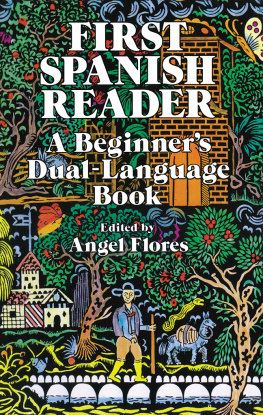
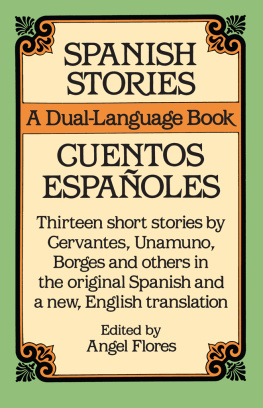

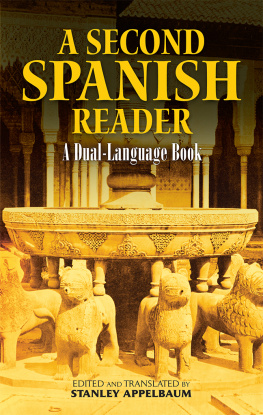
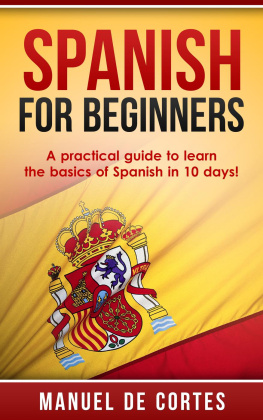
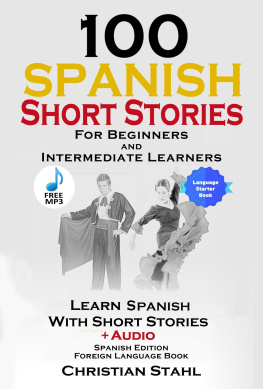
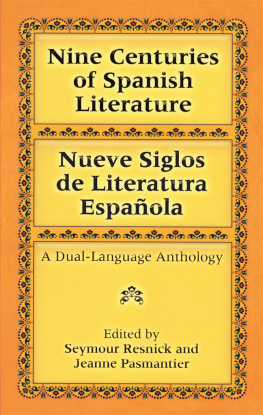
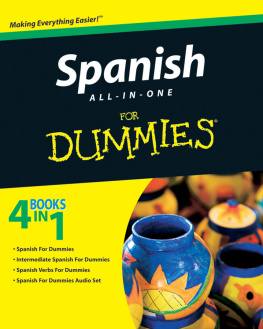
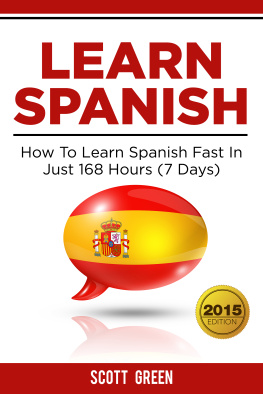
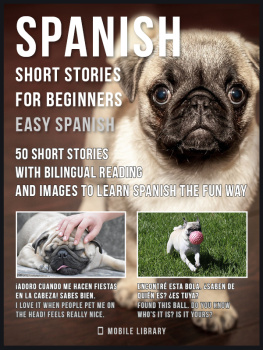
 Dover Publications, Inc.New York Copyright 1964 by Bantam Books, Inc. All rights reserved. This Dover edition, first published in 1988, is an unabridged and unaltered republication of the fourteenth printing (1982) of the work originally published by Bantam Books, Inc., New York, in 1964. Library of Congress Cataloging-in-Publication Data First Spanish reader: a beginners dual-language book
Dover Publications, Inc.New York Copyright 1964 by Bantam Books, Inc. All rights reserved. This Dover edition, first published in 1988, is an unabridged and unaltered republication of the fourteenth printing (1982) of the work originally published by Bantam Books, Inc., New York, in 1964. Library of Congress Cataloging-in-Publication Data First Spanish reader: a beginners dual-language book